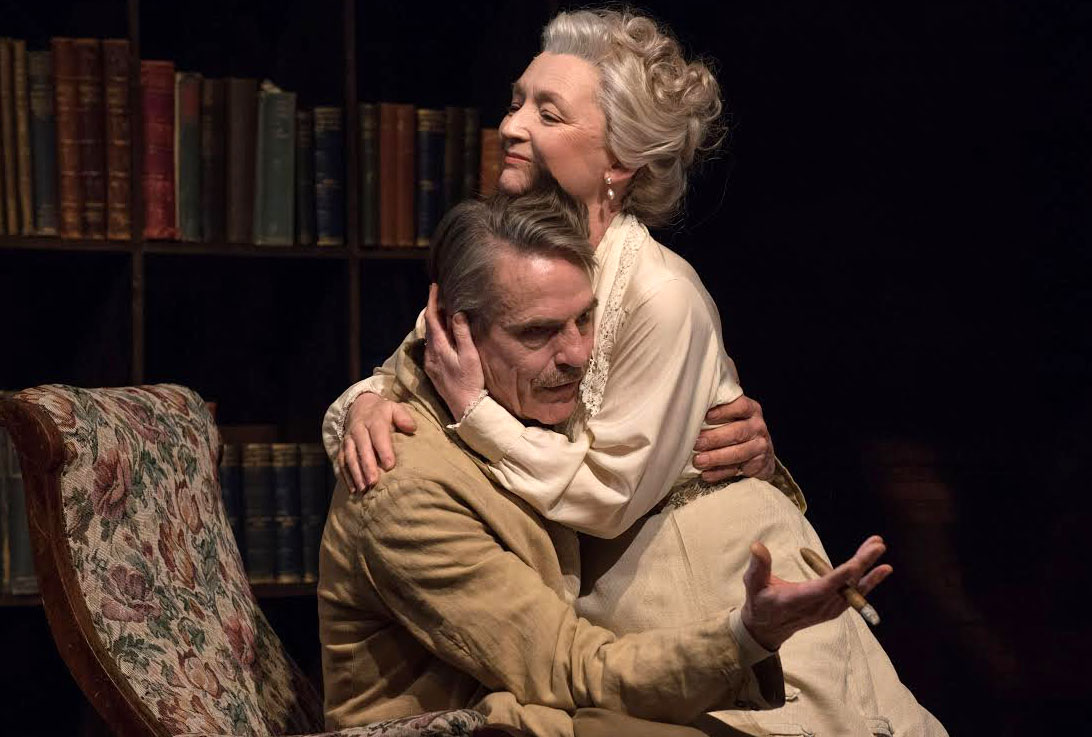
O’Neill’s chunk of raw biography is human tragedy in which the domestic is elevated to a peak of grandeur. The playwright has publicly disembowelled himself and presented the heaving, diseased and suppurating offal for the world to see. Small wonder he didn’t want it produced during his lifetime. The term ‘dysfunctional home life’ hardly does credit to what is more like an arena in which competing personalities clash in an endless round of recrimination and guilt. All of which takes place against a background of advancing disease and encroaching fog. The distant, plangent buoy seems to mark time on people who, whilst on top of a sandcastle, watch the advancing tide, knowing yet refusing to acknowledge that it will wash away the sand they stand on and render them into the sea.
Central to the descent of the ‘long day’s journey’ is the retreating sanity of Mary, the wife of James Tyrone as she fights a losing battle against drug addiction. Lesley Manville, as Mary, gives a sustained and compelling piece of high quality acting which delivers on the detailed descriptions in O’Neill’s script: the distracted touching of the hair, the constant battle with the pain of rheumatism and the sudden changes from coquettish innocent to embittered wife and mother as she drifts in and out of her drugged haze, all the while sensitive to her family’s accusing gaze. Her last entrance sticks in the memory, distant yet strangely fulgent – contrasting with the fuliginous atmosphere of the ominous sea-fog and mournful fog-horn. The fog, a metaphor for her diminishing mental acuity as it retreats behind ever enfeebling, drug-induced veils, finally engulfs the family. Peter Mumford’s expressive lighting adds to the lambent, ethereal quality of that entrance which brought to mind an abstracted Miss Havisham.
Jeremy Irons’ portrait shows us a Tyrone with unfulfilled ambition as a great Shakespearean leading man, a matinee idol with more concern for his bank balance than drive to scale the dramatic heights; a man who loves his wife, but has run out of the fight necessary to take on yet another battle, and a self-justified miser who has failed to pay for the best care for his wife and son.
Hadley Fraser as the louche elder son, Jamie, gets inside the skin of the hard drinking failure. The destructive ambivalence of his relationship with his younger brother surfaces with great effect in the last act scene of revelation.
In Edmund (O’Neill’s self portrait) the consumptive writer, Billy Howle finds a nice balance between poetic fervour and invalid. Jessica Regan brings some welcome light relief in her witty cameo of Cathleen the garrulous servant.
Being an exercise in blisteringly honest biography, it is a play that doesn’t really admit of creative interpretation and Richard Eyre has rightly concentrated on getting great performances from his cast whilst serving the clearly laid out intentions of the author. Similarly, Rob Howell’s set nods both to the realism to the Tyrone holiday home and the metaphor of the encircling fog. ★★★★☆ Graham Wyles 30th March 2016

